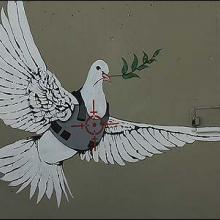collateral damage

Image via Bartosz Nitkiewicz / Shutterstock.com
A strike by U.S. jets nearly 60civilians on July 19 after mistaking them for ISIS fighters, reports The Telegraph.
Before being killed, eight families were fleeing their village of Tokhar in order to escape fighting between ISIS and the U.S.-backed rebels known as the Syria Democratic Forces, according to the reports.
News agencies reported Saturday morning that weeks ago President Obama signed an order, kept secret until now, to authorize continuation of U.S. military operations in Afghanistan for at least another year. The order authorizes U.S. airstrikes “to support Afghan military operations in the country” and U.S. ground troops to continue normal operations, which is to say, to “occasionally accompany Afghan troops” on operations against the Taliban.
The administration, in its leak to the New York Times, affirmed that there had been “heated debate” between Pentagon advisers and others in Obama’s cabinet chiefly concerned not to lose soldiers in combat. Oil strategy isn't mentioned as having been debated and neither is further encirclement of China, but the most notable absence in the reporting was any mention of cabinet members’ concern for Afghan civilians affected by air strikes and ground troop operations, in a country already afflicted by nightmares of poverty and social breakdown.
While the concern for civilians may have been discussed even if not reported, it’s worth pointing out some of the suffering people on the ground continue to experience. Here are just three events, excerpted from an August 2014 Amnesty International report, which President Obama and his advisors should ha considered (and allowed into a public debate) before once more expanding the U.S. combat role in Afghanistan:
AS THE U.S. prepares to officially (but not completely) pull out its military from Afghanistan by the end of 2014, some wonder whether it all was a waste. More than a decade of war has cost tens of thousands of lives and hundreds of billions of dollars. But the balance sheet of “lessons learned” shows some less-depressing calculations.
In the last several years, U.S. generals have repeatedly told Congress and the U.S. public that “there is no military solution” to the war in Afghanistan. This marks a significant shift in military thinking. In the early 2000s, the boastful, overconfident views that wars in Afghanistan and Iraq would be quick and easy outnumbered more cautious and skeptical military voices. If nothing else, more military leaders today are forthrightly speaking out against the fantasy of firepower solutions to complex political problems.
The U.S. and its Western allies are also learning a related lesson: The lack of legitimate governance is a fundamental cause of much of the world’s violence. Afghanistan’s political leaders who opposed the Taliban became de facto Western allies, even though many had ruled by force and racked up their own long list of human rights abuses. In the rush to set up a new government to replace the Taliban, the West propped up corrupt and tyrannical warlords as provincial governors, dooming hopes for an Afghan democracy and authentic leaders with popular support.
Counterinsurgency projects attempted to pull support from the Taliban and other insurgents by winning Afghan hearts and minds so they would trust their government. But Western military forces learned that free handouts of Western aid money could not fundamentally change the corrupt nature of the Afghan government or its public image.
SOME CHRISTIANS seeking moral guidance about drone warfare find enough clear teaching in Jesus’ command to love our enemies and respond to conflict with principled, active nonviolence. Other Christian traditions, seeking to restrict and limit warfare, have developed principles of “just war,” which deem certain acts of war immoral and illegitimate. Targeted killings by drones, which have become key elements of the Obama administration’s counterterrorism strategy, fail the test of morality on a number of grounds:
1. Targeted assassinations outside of legally declared wars violate international law, which prohibits a country from carrying out military attacks in or against the territory of countries with which it is not at war. Drone attacks in Pakistan, Yemen, and Somalia violate this prohibition.
2. They violate the sovereignty of other countries. The government of Pakistan has repeatedly objected to drone strikes on its territory, calling them a “clear violation of our sovereignty and a violation of international law,” but its concerns have been repeatedly ignored.
3. There is little transparency or accountability. CIA drones are remotely controlled, primarily from Air Force bases in the United States, with no clear accountability, and with the targeting sometimes based on dubious intelligence.
HEY PRESIDENT OBAMA: The Nobel Peace Prize committee is calling. They want their medal back.
The coveted award, which many felt was premature, at best, when bestowed during the president’s first year in office, was seriously tarnished in the eyes of many by his escalation of the war in Afghanistan and other military endeavors.
But Obama’s role in waging drone warfare—particularly in Pakistan and Yemen—has made a mockery of the prize that Alfred Nobel said should go to the person “who shall have done the most or the best work for fraternity between nations.”
Obama’s drone attacks—according to a May investigation by The New York Times, Daniel Klaidman’s new book Kill or Capture, and other sources—are arguably in direct violation of U.S. and international law, and immoral to boot.
The drone attacks started out with clear rules: Only target those who represent a direct threat to the United States. Those rules soon went out the door—a senior U.S. official called it a “little liberalization that went on in the kill lists,” according to The Washington Post, while a former counterterrorism official said that “the elasticity of that has grown over time.”
Today I was catching up on emails and came across two messages that deeply affected me, maybe because I read them back-to-back.
The first one is from a friend who helped release the “Collateral Murder” video via Wikileaks, showing US troops shooting some unarmed folks in Baghdad, including two children sitting in a van as their family stopped to pick up the wounded and dead. It is one of the most disturbing and heartbreaking videos I’ve ever seen. Feel free not to watch it.
NOTE: If you do watch the video inside the blog, please know that it is contains vivid images of war. It was released here:
The other email message I read was just the opposite. It was about life.
Your voice is being heard. Already, thousands of you have signed a letter and contacted the White House urging a new way forward in Afghanistan.




